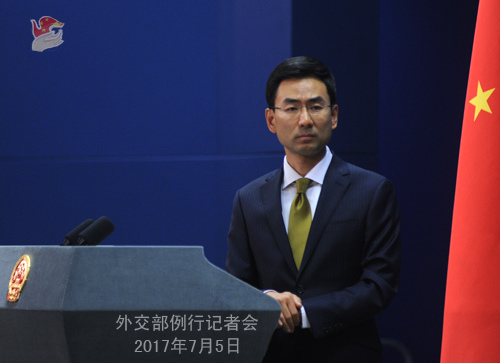
Chinese Foreign Ministry spokesperson Geng Shuang (Photo source: fmprc.gov.cn)
China Wednesday urged India to immediately withdraw its border troops that have crossed into Chinese territory and correct its mistakes with practical actions.
"The Indian troops are currently in Chinese territory, and the matter remains unsettled," Chinese Foreign Ministry spokesperson Geng Shuang said at a routine press briefing.
He urged India to show sincerity in resolving border disputes and developing bilateral ties, and create conditions for the normal development of China-India relations.
Geng said the Sikkim section of the China-India border was defined in the Convention Between Great Britain and China Relating to Sikkim and Tibet in 1890. Successive Indian governments have acknowledged the demarcation.
He also cited a note presented by the Indian embassy in China to the Chinese Foreign Ministry on Feb. 12, 1960, to explain the Indian border incursion.
The Indian government welcomed China's note explaining the demarcation of the border, saying Sikkim and Bhutan belonged to one side of the border while Tibet stood at the other side, according to the Indian embassy note.
The Indian embassy note quoted a Chinese note as saying that the border between Sikkim and Tibet had been officially defined, and there was no divergence or disputes in the map drawing as well as in practice.
The Indian government was willing to add that the boundary had also been marked on the ground, the Indian note said.
Geng said India's recent move has violated the goals and principles of the UN Charter, and trampled on international laws and the basic norms of international relations.
In the early 1950s, China, India and Myanmar jointly initiated the Five Principles of Peaceful Co-existence, featuring mutual respect for each other's territorial integrity and sovereignty, non-aggression, non-interference in each other's internal affairs, equality and cooperation for mutual benefit, and peaceful co-existence.
"By illegally crossing into another country's territory, India has tread on the basic norms of international relations it had initiated itself," said the spokesperson.
"How can India win the trust of its neighboring countries and play a greater role in global affairs, if it does not correct its mistakes in a timely way?" Geng said.


















































